From DePaul to the World: Alumni See Business From a Global View
By Lori Ferguson
With virtually every business doing some business overseas, international business knowledge, cultural awareness and relationship-building skills are critically important for professionals today. Faculty at the Driehaus College of Business are nurturing these qualities in DePaul graduates in a host of ways—through classroom encounters, study abroad seminars and international business education initiatives that offer students numerous points of entry into the global economy.
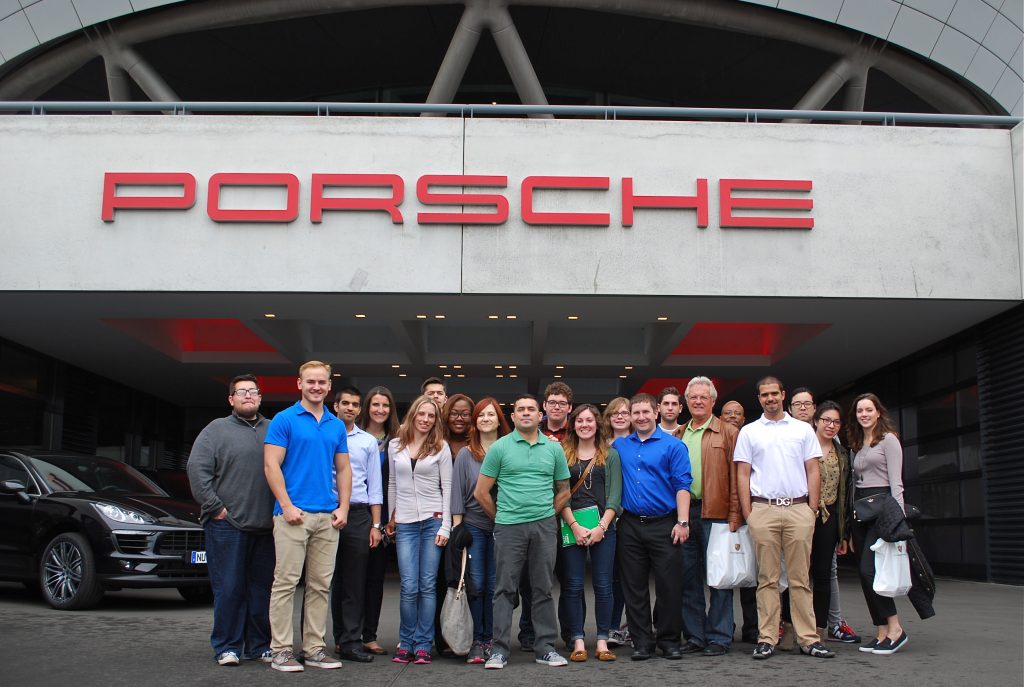
“Global business opportunities are so pervasive that every one of our students must receive an international perspective, even thou though they may never plan to do business abroad,” notes Dean Ray Whittington.

Alumni who conduct business abroad, like Driehaus College of Business Advisory Council member Jim Logothetis (BUS ’77), say a global business orientation offers a competitive advantage. “As a student, you need to realize how critical global business is, and it’s hard to do that when you’re immersed in your own culture,” Logothetis says. A partner with Ernst & Young’s Assurance Practice, Logothetis has lived and worked in the U.S. and abroad over his past 36 years with E&Y, serving large international companies both public and private. “The business world is very global now, so it’s imperative that students learn to think globally and expose themselves to other cultures and ways of doing business by interacting with students from other countries and traveling abroad themselves whenever possible,” Logothetis notes.
DePaul’s business college offers students several advantages in this regard, he says. Located in the heart of Chicago’s Loop, the school sits at the nexus for business in a world-class city. DePaul also attracts a significant number of international students, thus offering many opportunities for students to learn about other cultures through personal interactions, and it has an outstanding MBA program. “In direction, tone and strategy, DePaul is well positioned to prepare its students for the challenges and opportunities they will encounter in a global economy,” Logothetis says.

Don Scheibenreif (BUS ’87), vice president and distinguished analyst at Gartner, Inc., likewise believes that to succeed, students must be willing to keep an open mind and step outside their comfort zone. A seasoned international businessman, Scheibenreif credits DePaul for preparing him solidly in both respects. “My DePaul education taught me to be open-minded, a valuable quality when working overseas, because you have to let go of preconceived notions and learn new ways of interacting. My coursework at DePaul fostered an attitude of curiosity and a thirst for continuous learning that has served me well.”
Building Relationships Abroad
For nearly a decade now, Associate Professor of Marketing Zafar Iqbal has witnessed firsthand the benefits students gain through exposure to other customs and cultures. Together with Executive-in-Residence Luis Larrea, Iqbal leads groups of business students on study abroad seminars to his native India, as well as to Japan. “Obviously, who you are determines what you get out of the experience,” he observes, “but everyone who participates in the seminars has one important realization: business is all about relationships. Over the course of two weeks, you watch students’ perspectives change—they’re no longer fearful of ‘the other.’ They’re inundated with new experiences—differences in class, cuisine, culture and temperature—which is mentally exhausting, but also exhilarating.”
Students expand their horizons and hone their ability to break the ice with strangers, Iqbal explains, both of which enhance their self-confidence. They also gain greater empathy for others, having experienced that feeling of utter foreignness themselves. “Everyone returns with an appreciation for the intensity of friendships and a much better understanding of what a multicultural learning environment is really all about.”
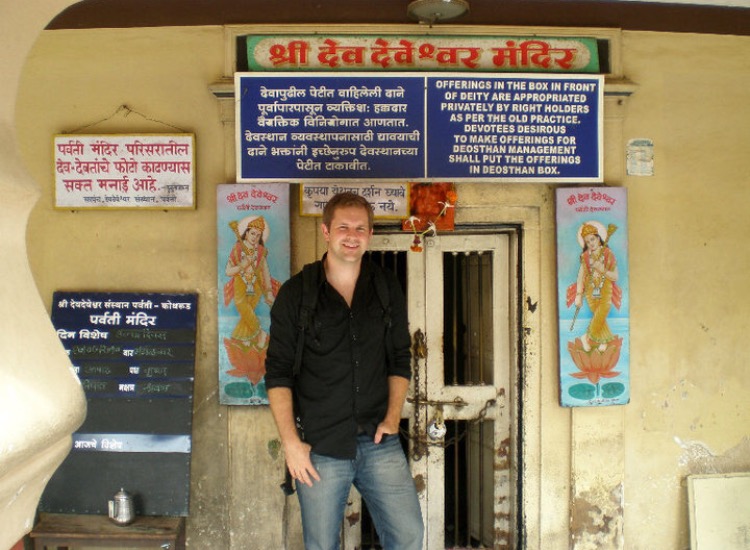
Study abroad helped prepare Michael Korycki (MBA ’11) for work at an international company after graduation.
Korycki, a participant in a summer 2010 study abroad seminar in India, says his two-week sojourn provided him with more relevant experiences than he could have gathered in two months in-country on his own. Today, Korycki is putting those insights to work as a project manager at Global Cloud Xchange, an international provider of integrated communications solutions for businesses and a business unit of Mumbai-based Reliance Communications.
“Exposure to different cultures and other ways of doing business is so informative, particularly in an emerging economy like India,” he says. “Encountering so many new people, cities and companies in a short amount of time forces you to think harder and look at things more critically. I wouldn’t trade the experience for anything. The trip increased my confidence during the interview process and enhanced my ability to interact successfully with my Indian colleagues.”

Christopher Huberts (BUS ’09) is similarly enthusiastic. A manager of product management for Amazon.com in India, Huberts majored in marketing at DePaul and was a member of the first international business seminar Iqbal led to India in 2008. “Despite reading every book on the recommended reading list, I was still blown away with what I experienced.”
Huberts returned from the trip determined to work in India one day, and six years later, his dream was realized. He’s now wrapping up his overseas assignment and says he’s had a life experience that he’ll never forget. “As a businessperson, working so closely to an epicenter of technology has given me instant ‘street cred’ with the software engineers at my company and made initial conversations with hiring managers much easier. Studying abroad can offer perspective and insights that go way beyond the classroom.”
An Eye-Opening Experience for International Students
International students who come to DePaul also derive great value from the cross-cultural experience, whether they choose to remain in the States after graduating or return to their home country. Chelsea Cai (MS ’13), an assistant manager with JLL (formerly Jones Lang LaSalle) in Tianjin, China, says that her two years at DePaul exposed her to American culture, improved her interpersonal skills and generally “opened my eyes to the world.”
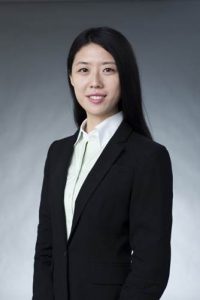
International students who come to DePaul also derive great value from the cross-cultural experience, whether they choose to remain in the States after graduating or return to their home country. Chelsea Cai (MS ’13), an assistant manager with JLL (formerly Jones Lang LaSalle) in Tianjin, China, says that her two years at DePaul exposed her to American culture, improved her interpersonal skills and generally “opened my eyes to the world.”
Cai identifies three aspects of her educational experience as particularly important: DePaul’s premium location in Chicago’s financial district, the extensive career preparation offered by Kellstadt Graduate School of Business’s Career Management Center and the multitude of alumni resources and networking opportunities available at DePaul. It was through alumni resources that Cai found an internship at Barrington Research Associates and later a position at Chicago-based Cambridge Realty Capital.
“These training opportunities and interactions with different levels of people enhanced my professionalism and increased my ability to communicate effectively,” Cai says. Back in China, the benefits continue to accrue. “My international experience helped me to grow faster than my peers and has given me the confidence to grasp any opportunity I feel like trying,” Cai explains.
Likewise, Joey Jiang (MS ’13), a fund accounting analyst at J.P. Morgan in Chicago, was initially drawn to DePaul because of its location in the heart of the city. She quickly discovered that the school offered many additional benefits, particularly to international students. “DePaul is very open to students with different backgrounds, so you can always find a fit,” she notes.
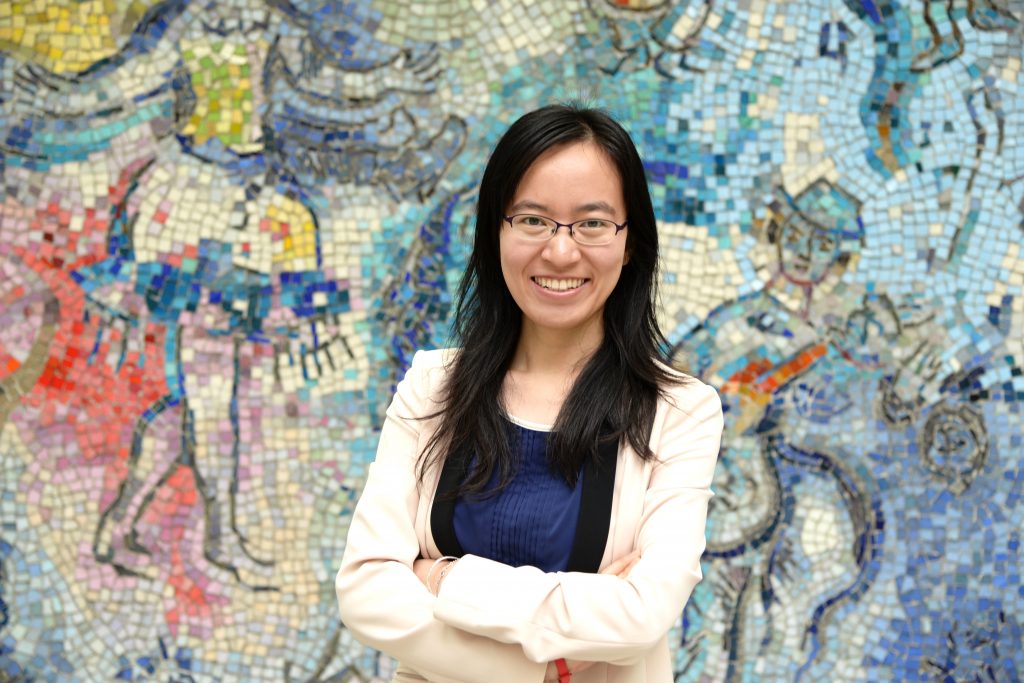
Jiang also found DePaul’s professional resources, including career and alumni mentoring services, very beneficial. As a student, she secured an accounting internship with Careforde, a Chicago-based health care supplier, through the Kellstadt Career Management Center. “The internship was very helpful. It gave me a better understanding of my strengths and weaknesses and provided wonderful talking points for interviews after I graduated.” Jiang also credits her time at DePaul with helping her to develop self-understanding, self-discipline, maturity and confidence. “I learned the importance of teamwork and communication at DePaul, two skills that I know will serve me well throughout my life.”
A Wider Vision of Business
Another aspect of DePaul’s global education strategy involves collaborations with international partners, including the Bahrain Institute for Banking (BIBF), an educational institution with which DePaul has enjoyed a thriving relationship since 2001. Through this partnership, DePaul business faculty travel to BIBF’s facilities in Manama to teach students enrolled in DePaul’s MBA, MS in Human Resources Management or MS in Finance degree programs in Bahrain.
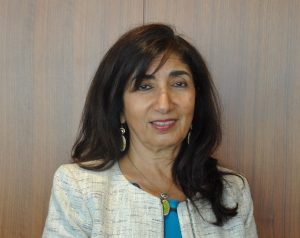
Among the program’s graduates is Sabah AlMoayyed (MBA ’05), founder of Intellect Resources Management W.L.L., a management consultancy firm in Bahrain that specializes in leadership and entrepreneurial training for middle to executive management, with a focus on women. AlMoayyed started her business in 2013, following a successful career in banking and finance, and is a vocal advocate of cross-cultural education, having experienced the benefits throughout her career.
AlMoayyed studied abroad first as an undergraduate and then as a participant in several advanced management programs at The Wharton School and the University of Virginia. In addition to spending nearly 10 years as general manager and board member of Eskan Bank, Bahrain’s largest public-sector mortgage and property development bank, she also worked at Citibank in Bahrain and Dubai and spent seven months with Morgan Stanley in New York.
“My DePaul experience at BIBF refreshed my connection with experienced faculty who delivered a broader, more up-to-date view of the best practices in management, finance, human resources and capital markets,” explains AlMoayyed.
Bringing business expertise into her country and sending the younger generation abroad to gain exposure to business practices in other parts of the world are important, she continues. In fact, AlMoayyed’s son was an undergraduate at DePaul in Chicago at the same time she was completing her MBA in Bahrain. At one point they even studied with the same professor.
Like many other DePaul graduates, AlMoayyed found that multicultural learning experiences enhanced not only her technical skills, but also soft skills like presentation, critical-thinking, and decision-making techniques that every person in business must master to succeed.
Although already in a CEO role and a board member when she began her MBA, AlMoayyed says that the experience helped her immeasurably. “It re-emphasized to me the fact that there is no end to continuous learning, introduced me to the latest management practices and brought me up-to-date with technology, research and rationalizing output,” she says. “Cross-cultural exchange helps to widen our vision, allows us to study best practices on a macro level and adopt what’s best for us within our own business culture.”
